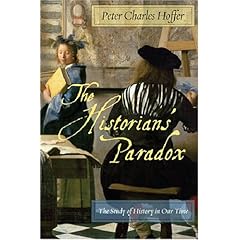The Historian's Paradox by Charles Peter Hoffer
 [From an essay published on HNN;] History is impossible. Nothing I have written or could write in The Historians' Paradox: A Philosophy of History for Our Times, will change that brute fact. We cannot go back in time. But doing history, studying the past, is not impossible. If we are to traverse the creative bridge from present to past, we must confront this challenge. There is a striking scene near the end of the movie “Indiana Jones and the Last Crusade.” Indiana Jones must cross a yawning chasm to reach the cave that houses the holy grail. He must have faith in his quest and that faith requires he take a step into what appears to be empty space. He does, and finds solid ground–a bridge to the other side. What we need to complete our philosophy is a step of faith onto the bridge every historian constructs.
[From an essay published on HNN;] History is impossible. Nothing I have written or could write in The Historians' Paradox: A Philosophy of History for Our Times, will change that brute fact. We cannot go back in time. But doing history, studying the past, is not impossible. If we are to traverse the creative bridge from present to past, we must confront this challenge. There is a striking scene near the end of the movie “Indiana Jones and the Last Crusade.” Indiana Jones must cross a yawning chasm to reach the cave that houses the holy grail. He must have faith in his quest and that faith requires he take a step into what appears to be empty space. He does, and finds solid ground–a bridge to the other side. What we need to complete our philosophy is a step of faith onto the bridge every historian constructs.
Where does such a faith arise? Not in the jargon of arcane academic methodologies. When Erasmus dedicated his Praise of Folly to his English host, Thomas More, both men knew that the real purpose of the essay was to get its readers to think about the folly that knowing philosophy or rhetoric could save a man, when faith could not. Erasmus: “All Christian religion seems to have a kind of alliance with folly and in no respect to have any accord with wisdom. Of which if you expect proofs, consider first that boys, old men, women, and fools are more delighted with religious and sacred things than others, and to that purpose are ever next the altars; and this they do by mere impulse of nature. And in the next place, you see that those first founders of it were plain, simple persons and most bitter enemies of learning.”